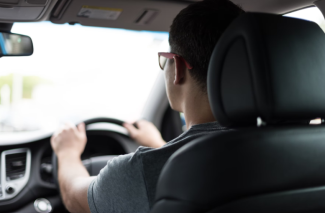How often should you have an eye test as a driver in the UK?
Having regular eye tests is one of the most important things you can do for your health, even if you think you have perfect vision.
That is because eye tests can help ensure your glasses or contact lens prescription is up to date, while also detecting any early warning signs of eye conditions and other health issues like diabetes and cardiovascular disease.
The NHS recommends that most people should get their eyes tested every 2 years. An optometrist may recommend more frequent sight tests for children who wear glasses, people aged 40 or over with a family history of glaucoma, people aged 70 or over and people who have diabetes.
It’s needless to say that having good vision is particularly important for drivers, which is why learner drivers are asked to read a number plate correctly from a distance at the start of their practical driving test.
But how often should you check your eyesight after passing your driving test, and how many UK drivers actually follow the guidance?
To find out, we asked 2,000 UK drivers questions about when they had their last eye test. We also asked about which eye conditions they have, and whether they have had any recent car accidents.
Half of UK drivers did not have an eye in the last two years
Our data revealed that millions of UK drivers are not following the NHS guidance, as half (50%) of respondents did not have an eye test in the last two years.
In fact, one in ten (11%) told us they never had a professional eye test before, while the remaining 39% last visited their optometrist two or more years ago.
These statistics are even more concerning when we take into account that nearly three-quarters of drivers also told us they wear prescription glasses or contact lenses.
Short-sightedness was the most common eyesight issue, impacting almost a quarter of drivers (23%). This was followed by long-sightedness (19%), floaters (18%) and dry eyes (16%).
| Eye condition | Experience this condition |
| Short-sighted | 23% |
| Long-sighted | 19% |
| Floaters | 18% |
| Dry eyes | 16% |
| Astigmatism | 8% |
| Double vision | 3% |
| Cataracts | 3% |
| Diabetic Retinopathy | 2% |
| Glaucoma | 1% |
| Macular Degeneration | 1% |
Which types of drivers are the most likely to ignore eye health advice?

According to our data, bus and lorry drivers were the most likely to ignore NHS guidance when it comes to their eyesight, with more than two in three (69%) stating that they had not had their eyes tested in the last two years.
Nearly one in five of bus and lorry drivers (16%) even admitted to never having had their eyes checked before.
Over half of motorcyclists ignore NHS guidance on getting their eyes checked (57%), followed by car/van drivers (50%).
While most of cyclists (60%) and pedestrians (63%) said they had an eye test in the last two years, these figures still leave millions who are ignoring the call to go for routine check-ups.

Which age group is the least likely to have had a recent eye test?

Young drivers aged between 25-34 were the most likely to ignore NHS guidelines on eye tests (68%), according to our research. Nearly a quarter (23%) said that they had never had their eyes tested.
Worryingly, over two-thirds (71%) of respondents from this age group also complained of eyesight issues, the highest percentage of any age group in the study.
Drivers between the ages of 25-34 were also the most likely to be involved in a road traffic accident, with over a third (38%) stating they had been involved in a crash within the last two years.
Despite a greater chance of eyesight deterioration than for younger generations, two in five (43%) of those aged between 45-54 do not follow NHS guidelines when it comes to their eyesight.
This not only poses a risk for other road users, but also means that these 45–54-year-olds could be missing out on critical information about their eye health which is needed to spot early symptoms and get treatment for age-related health conditions.
How does the data compare regionally?
According to our survey, Belfast drivers were the most likely to ignore NHS guidance when it comes to their eyesight, with almost three quarters of respondents (73%) stating they had not had their eyes tested within the last two years.
Almost one in four from Belfast even said they had never had their eyes tested before (24%), followed by Glasgow (22%) and Bristol (20%).
| City | Not had eyes tested within the last two years |
| Belfast | 73% |
| Birmingham | 52% |
| Bristol | 56% |
| Cardiff | 44% |
| Edinburgh | 51% |
| Glasgow | 52% |
| Leeds | 52% |
| Liverpool | 38% |
| London | 53% |
| Manchester | 56% |
| Newcastle | 52% |
| Norwich | 55% |
| Nottingham | 39% |
| Sheffield | 43% |
| Southampton | 39% |
On the other hand, Liverpool drivers were found to be the most likely to follow the guidance, however over a third (38%) still said they didn’t go for a recent eye test. They were closely followed by drivers from Southampton (39%) and Nottingham (39%).
How to book an eye test
Was your last eye test more than two years ago? Don’t worry, it’s not too late to book an appointment with a specialist near you today.
At the comprehensive examination, the optometrist will check whether your eyes are healthy when wearing contact lenses. They will also take digital photographs of the back of your eyes to detect signs of any medical conditions.
The experts can also provide a full contact lens fitting and a full eye test will also be carried out to check the overall health of your eyes and update your glasses prescription.
Methodology
- Survey with 2,000 UK drivers, conducted in February 2023.



